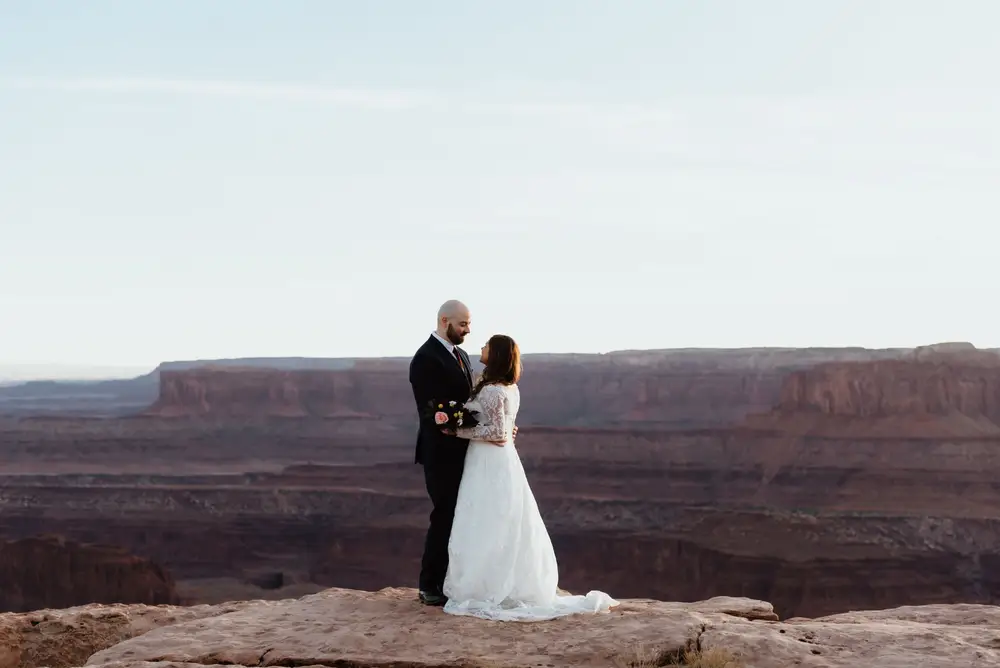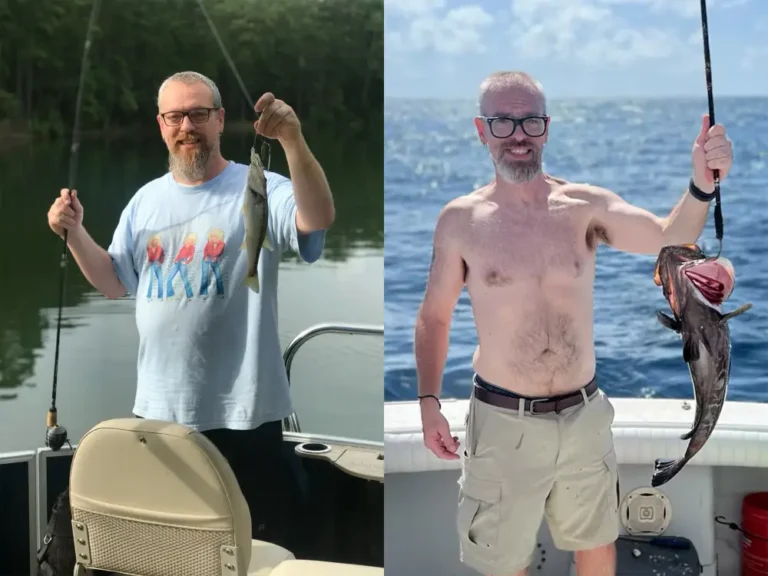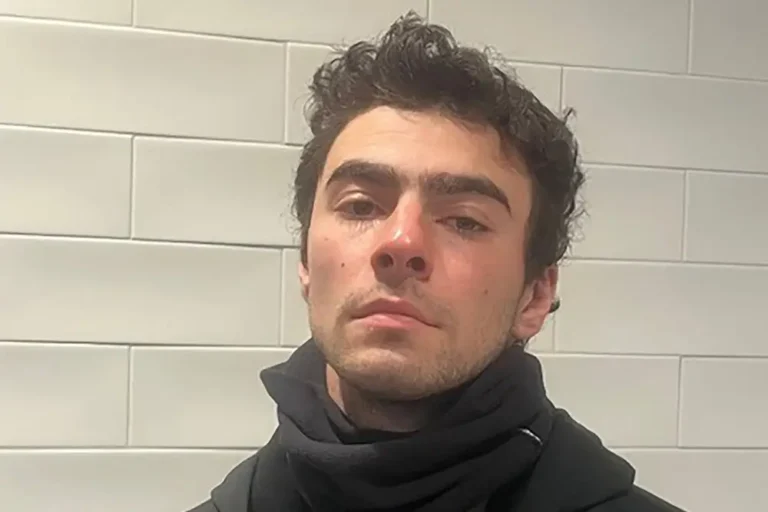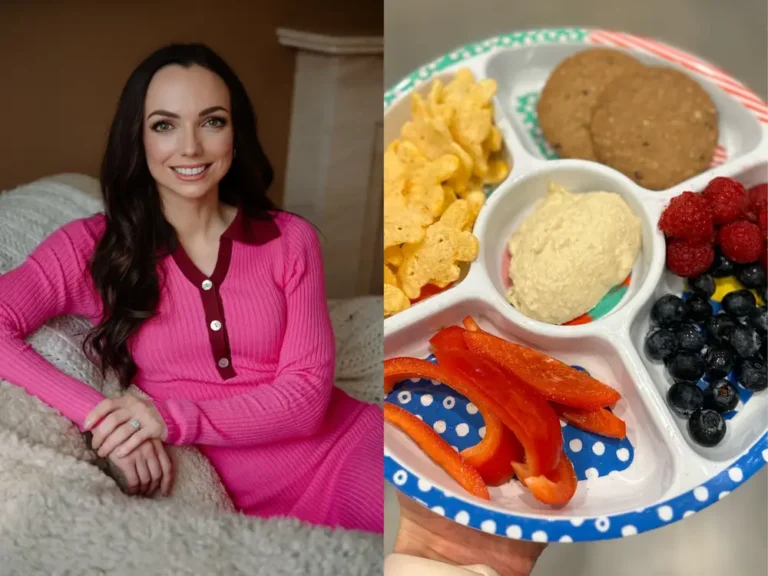Doctors told me I wasn’t old enough for cancer. When I finally got a diagnosis, it was Stage 4.

I was misdiagnosed for years before my cancer diagnosis.
Who’s going to deliver the crushing cancer diagnosis to the newlyweds in room five? I imagine this had to have been one of the conversations occurring on the other side of the door as Brian and I waited for the results of my final scan. The two of us sat in silence, unaware that soon our new vows would be tested while behind-the-scenes calls were being made, referrals placed, and handoffs prepared.
We’d arrived at 11 p.m., and as the clock rounded past 4 a.m., Brian and I were both beginning to doze off. We were awakened by a new doctor who appeared in the doorway. As he pulled up a stool next to the bed, he introduced himself as Dr. Morgan. I took notice of the beaded bracelet he wore on his wrist as he rested his hand gently on the bed, took a deep breath, and softened his gaze to break the news. “The CT scan we sent you for came back. We’ve found a large mass on your right kidney and a couple of lesions in your liver. We don’t know for sure, but we think it’s likely renal cell carcinoma, a type of kidney cancer.”
My vision tunneled in as my heart rate, quickly escalating, began setting off alarms behind me. For years, I had kept asking doctors if we could rule out cancer in my pursuit of vague symptoms. I’d been terrified of this moment, and the catastrophic worrying had led me to imagine the delivery of this news probably 100 times before. But now that it was actually happening, it was nothing like I’d imagined it would be. Despite my racing heart, why did I feel so calm? Brian squeezed my hand as I looked over my shoulder and watched him break into tears. That felt like the appropriate response here.
I shifted my gaze back to Dr. Morgan and asked in a calm and steady tone that surprised even me, “Is it terminal?”
I felt the emotion in his response. “We don’t know. We’ll need to run more tests and gather additional information, but we’ve already reached out to Huntsman Cancer Institute and have placed a referral to get you in as soon as possible. We may not have all the answers yet, but you have a whole team of doctors already working behind the scenes to figure this out.”
I was relieved to finally know what was happening with my health
Suddenly, I recognized the emotion that was washing over me. This wasn’t grief. It was a relief. It felt like I finally had an answer to why I’d been feeling off, and it wasn’t all in my head. I wasn’t surprised to hear something was wrong because I had known something was wrong; I just hadn’t gotten anyone to take me seriously. But now we had undeniable proof, and for the first time, I was sitting across from a doctor who believed me and seemed to care genuinely. I knew this wouldn’t be an easy road, but at least I no longer had to travel it alone.
As I thought about the appointments and memories that had led to this moment, the emotions finally caught up with me as I remembered the several doctors who had told me I was too young for cancer. The words looped in my head as I tried to make sense of it all before they found their way out without context.
“But other doctors told me I was too young for cancer.” My voice broke, and the grief crashed over me as I finally began processing the news. My blood pressure, now climbing, set off more alarms as I looked at the monitor, concerned. Dr. Morgan reminded me I had just received some pretty distressing news. “That’s a normal response; don’t worry about those for now,” he reassured me.
I focused again on the words circling in my head. “How could this happen? They told me I was too young for cancer,” I said aloud again as my voice trailed off in disbelief. Dr. Morgan explained that we don’t always know what causes cancer, empathetically apologized for the road that had led me here, and shared that this was personal for him, as his mom had battled with cancer as well. From the hint of sorrow in his voice, it sounded as if she might no longer be here. I wondered if this would be how people were going to talk about me one day, too.
As he stood up to leave, I thanked him for answering my questions and being patient with me. I knew he likely had a busy ER to attend to. But he had brought a calming presence into the room and never once made us feel rushed, which I truly appreciated. I was grateful that it was he who delivered the news to me that day.
I worried my diagnosis would change the life I envisioned with my husband
After he left the room, I turned to Brian and instantly apologized as we both began crying uncontrollably. I felt guilty like I was robbing him of his future and the life we had planned together. He told me to stop; he wasn’t going anywhere, and neither was I. I squeezed his hand as the door opened, and the nurse started to walk back in before being stopped and pulled back by the doctor to give us some space.
A social worker would be in soon to chat and help us process the news. My mind raced while we waited for her to arrive, and I asked Brian to look up the survival rates for kidney cancer. He pulled up a search on his phone and stared silently at it for a while. I wasn’t sure I wanted to find out what those rates were, but I also knew there was no way I was getting through the night without knowing. “It sounds like stage one is often cured with surgery, a survival rate of 93 percent.” Wow, OK, those sounded like good odds, but what did stage one mean? Time to Google the definition.
Stage one: The cancer has not spread, is only in the kidney, and isn’t larger than seven centimeters.
Hmm, OK, the doctor had mentioned the tumor on my kidney was 12 centimeters and that it had spread to my liver, so that disqualified me from that. What was the next stage?
Stage two: The cancer has not spread and is only in the kidney but is larger than seven centimeters.
Since mine was 12 centimeters, it seemed like it could fit in that category if those spots in my liver weren’t actually tumors. What were the survival rates for that?
The next stat was for regional spread, which the article described as the cancer spreading from outside the kidney to nearby structures or lymph nodes. It didn’t say anything about stage two, but from the description, we wondered if nearby structures could mean the liver. Neither of us was medically trained; it felt like we needed a definition for these definitions. Brian read off the survival rate for regional spread: 71%. Still not great, but not terrible. I could be part of that 71%. Not knowing if I fell into this category or not, he continued.
Stage three: The cancer may be any size, but it has spread to nearby sites outside the kidney.
This sounded a bit more like it matched the regional description. So maybe I was stage three? We were still thoroughly confused by what “nearby” meant, so I asked what the final stage was.
Stage four: The cancer has spread away from the kidney to distant sites or organs. The most common locations kidney cancer spreads or metastasizes to include distant lymph nodes, the lungs, bones, liver, and brain.
We had our answer. The liver was considered a distant organ. My stomach sank. Could I really be stage four? Afraid of the answer, I asked what the odds were for stage four. In a soft, defeated tone, Brian replied, “8%.”*
My eyes welled up with tears. Crushed, I muttered out a response. “That’s not zero . . .” I looked down toward my feet at the end of the bed and repeated softly back to myself, “8% isn’t zero.” I looked back over at Brain, tears pouring down my face. “I’m going to beat this, I’m going to fight; 8% isn’t zero. It’s not impossible. Even if there’s only a 1% chance I can make it, I can beat it,” I insisted.
His tears matched mine as they fell from his eyes, trailing into his beard. “Yes, you will.”






